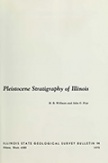Historical:Mackinaw Member
Lithostratigraphy: Mackinaw Member
Chronostratigraphy: Cenozoic Erathem >>Quaternary System >>Pleistocene Series
Authors
H. B. Willman and John C. Frye
Name origin
The Mackinaw Member of the Henry Formation is named for Mackinaw, Tazewell County.
Type section
The type section is in a gravel pit on the southwest side of the town of Mackinaw, NE NW Sec. 19, T. 24 N., R. 2 W., where 30 feet of gravel of the Mackinaw Member is overlain by 3 to 5 feet of silt of the Richland Loess that has the Modern Soil at the top.
Extent and thickness
The member is well exposed in pits in the terraces along the Mackinaw River Valley.
Lithology
The Mackinaw Member consists of sand and gravel outwash from the Wisconsinan glaciers that was deposited in the valleys. Remnants of these valley-train deposits are widely present in terraces and beneath the floors of the valleys. Many of the major valleys have had repeated intervals of filling and cutting, and in them the deposits occur in several terrace levels. Although the deposits in the different terraces may be similar or may differ notably in composition, they are all included in the Mackinaw Member. Differentiation of the terraces is based largely on physiographic expression, and they are morphostratigraphic units— alluvial terraces.
The valley-train deposits of the Mackinaw Member are more evenly bedded and more uniform in texture than the other members of the Henry Formation. Most of the deposits are sandy gravel or pebbly sand, but in some localities, such as along the Illinois Valley between Joliet and Channahon, the gravel is very coarse. Some of the deposits are related to the outlet rivers of glacial lakes rather than to direct discharge from the glaciers. These are included in the Mackinaw Member because of their position in the valleys and the difficulty in many areas of differentiating them from valley-train deposits.
Age and correlation
The Mackinaw Member is Wisconsinan in age.
ISGS Codes
| Stratigraphic Code | Geo Unit Designation |
|---|---|
